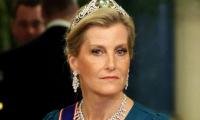‘Refugees must adapt to lifestyle in host countries’
Karachi An interactive roundtable session on the subject tiled “The refugee crisis in Europe” was held at the Pakistan Institute of International Affairs (PIIA) on Tuesday morning with Turkish Consul General Murat Mustafa Onart and the deputy head of mission at the German Consulate-General, Carsten Muller. Turkish Consul-General Onart said
By our correspondents
November 04, 2015
Karachi
An interactive roundtable session on the subject tiled “The refugee crisis in Europe” was held at the Pakistan Institute of International Affairs (PIIA) on Tuesday morning with Turkish Consul General Murat
Mustafa Onart and the deputy head of mission at the German Consulate-General, Carsten Muller.
Turkish Consul-General Onart said the refugee crisis did not start right now. Boatloads of refugees had been reaching the coast of Italy for a long time. He said there were large numbers of refugees pouring in from other countries like the countries of North Africa and others, but Turkey was not receiving enough funds to deal with the situation and cater to the needs of the refugee population.
“We have to see where the refugee crisis springs from and tackle the problem accordingly,” said Carsten Muller, the deputy head of mission at the German Consulate-General in town.
Germany, he said, had been having the refugee problem for a long time with refugees from North Africa, and now the focus was on those from Syria, with Germany and the UK being the main targets. “It is important for us to get support for the refugees. We have to see that they are treated in a fair manner,” he said.
The Turkish consul-general lamented that countries like Saudi Arabia, Kuwait and Qatar showed no responsiveness to the issue.
In reply to a question as to how far the laws had succeeded in dealing with the issue, he said that now they had a legal framework in place and there was a special directorate constituted to deal with the problem.
Muller said, “We have to get into a dialogue with the governments from where the displaced persons come. Germany had been dealing with the problem for a long time. Economic reasons do not constitute grounds for asylum. As for those who seek asylum, we expect them to assimilate in German society and adopt Germany as their homeland and its culture as theirs.”
Another participant pointed out that unless the underlying factors behind the refugee problem were tackled, there could be no end to the phenomenon and asked as to whether there could be a global strategy to deal with the issue, to which both the Turkish consul-general and the German deputy head of mission agreed.
The Turkish consul-general informed the participants that the Government of Turkey had set up 2,000 camps, but apart from these there were private ones too.
Muller said the camps had to adjust to different needs. It had to be seen to that a camp did not like a camp, and you have to get the refugees out of a place that looks like a camp.
“We have to give utmost consideration to religious identity. We are endeavouring to make Muslim refugees feel at home in Germany culturally. However, the refugees have to adapt to their new surroundings too. Anybody who wants to live in Germany must get it that he’s living in his own country. They have to take up the German lifestyle.”
A number of questioners asked if it was likely that the Ottoman Empire could be revived, to which the Turkish consul-general replied that the thought of the Ottoman Empire was good for nostalgia but conditions had changed and these were not the days of an empire.
An interactive roundtable session on the subject tiled “The refugee crisis in Europe” was held at the Pakistan Institute of International Affairs (PIIA) on Tuesday morning with Turkish Consul General Murat
Mustafa Onart and the deputy head of mission at the German Consulate-General, Carsten Muller.
Turkish Consul-General Onart said the refugee crisis did not start right now. Boatloads of refugees had been reaching the coast of Italy for a long time. He said there were large numbers of refugees pouring in from other countries like the countries of North Africa and others, but Turkey was not receiving enough funds to deal with the situation and cater to the needs of the refugee population.
“We have to see where the refugee crisis springs from and tackle the problem accordingly,” said Carsten Muller, the deputy head of mission at the German Consulate-General in town.
Germany, he said, had been having the refugee problem for a long time with refugees from North Africa, and now the focus was on those from Syria, with Germany and the UK being the main targets. “It is important for us to get support for the refugees. We have to see that they are treated in a fair manner,” he said.
The Turkish consul-general lamented that countries like Saudi Arabia, Kuwait and Qatar showed no responsiveness to the issue.
In reply to a question as to how far the laws had succeeded in dealing with the issue, he said that now they had a legal framework in place and there was a special directorate constituted to deal with the problem.
Muller said, “We have to get into a dialogue with the governments from where the displaced persons come. Germany had been dealing with the problem for a long time. Economic reasons do not constitute grounds for asylum. As for those who seek asylum, we expect them to assimilate in German society and adopt Germany as their homeland and its culture as theirs.”
Another participant pointed out that unless the underlying factors behind the refugee problem were tackled, there could be no end to the phenomenon and asked as to whether there could be a global strategy to deal with the issue, to which both the Turkish consul-general and the German deputy head of mission agreed.
The Turkish consul-general informed the participants that the Government of Turkey had set up 2,000 camps, but apart from these there were private ones too.
Muller said the camps had to adjust to different needs. It had to be seen to that a camp did not like a camp, and you have to get the refugees out of a place that looks like a camp.
“We have to give utmost consideration to religious identity. We are endeavouring to make Muslim refugees feel at home in Germany culturally. However, the refugees have to adapt to their new surroundings too. Anybody who wants to live in Germany must get it that he’s living in his own country. They have to take up the German lifestyle.”
A number of questioners asked if it was likely that the Ottoman Empire could be revived, to which the Turkish consul-general replied that the thought of the Ottoman Empire was good for nostalgia but conditions had changed and these were not the days of an empire.
-
 Princess Beatrice, Eugenie Resort To Begging Sarah Ferguson: 'It'll Bring Disaster For The Whole Family'
Princess Beatrice, Eugenie Resort To Begging Sarah Ferguson: 'It'll Bring Disaster For The Whole Family' -
 Jenny Slate Hails Blake Lively Amid Lawsuit Against Justin Baldoni
Jenny Slate Hails Blake Lively Amid Lawsuit Against Justin Baldoni -
 Sophie Wessex Shares 'frustration' From Early Days In Royal Family
Sophie Wessex Shares 'frustration' From Early Days In Royal Family -
 Jason Momoa's Aquaman Unseen Snap Revealed
Jason Momoa's Aquaman Unseen Snap Revealed -
 Prince Harry Taught Only Way King Charles 'will Take Him Seriously'
Prince Harry Taught Only Way King Charles 'will Take Him Seriously' -
 Meghan Markle’s Reaction To UK Talks With Prince Harry Comes To The Forefront: ‘Leaving Me?’
Meghan Markle’s Reaction To UK Talks With Prince Harry Comes To The Forefront: ‘Leaving Me?’ -
 Taylor Swift Slams Justin Baldoni In Explosive Text Messages, Court Filing Reveals
Taylor Swift Slams Justin Baldoni In Explosive Text Messages, Court Filing Reveals -
 Blake Lively’s Drops New Allegations Against Justin Boldoni About Birth Scene
Blake Lively’s Drops New Allegations Against Justin Boldoni About Birth Scene -
 Andrew's Reasons For Giving Sarah Ferguson A Rent-free Home For 30 Years After Divorce Finally Finds An Answer
Andrew's Reasons For Giving Sarah Ferguson A Rent-free Home For 30 Years After Divorce Finally Finds An Answer -
 Charlie Puth Reveals Wake-up Moment That Made Him Quit Alcohol
Charlie Puth Reveals Wake-up Moment That Made Him Quit Alcohol -
 Meghan Trainor Welcomes Baby Girl Mikey Moon Trainor And Turns Emotional
Meghan Trainor Welcomes Baby Girl Mikey Moon Trainor And Turns Emotional -
 Meghan Markle Would Not 'hide Away' From UK For Harry's Sake
Meghan Markle Would Not 'hide Away' From UK For Harry's Sake -
 Why Keith Urban's Daughters Are Avoiding His Rumored Girlfriend? Source
Why Keith Urban's Daughters Are Avoiding His Rumored Girlfriend? Source -
 Sarah Ferguson Led Andrew To Jeffrey Epstein: ‘She Wanted Him To Ask For More Money’
Sarah Ferguson Led Andrew To Jeffrey Epstein: ‘She Wanted Him To Ask For More Money’ -
 Blake Lively Claimed Justin Baldoni 'made A Monster' Of Her, Court Docs Reveal
Blake Lively Claimed Justin Baldoni 'made A Monster' Of Her, Court Docs Reveal -
 Prince William Accused Of 'harsh Decisions' Over Disgraced Royal
Prince William Accused Of 'harsh Decisions' Over Disgraced Royal



